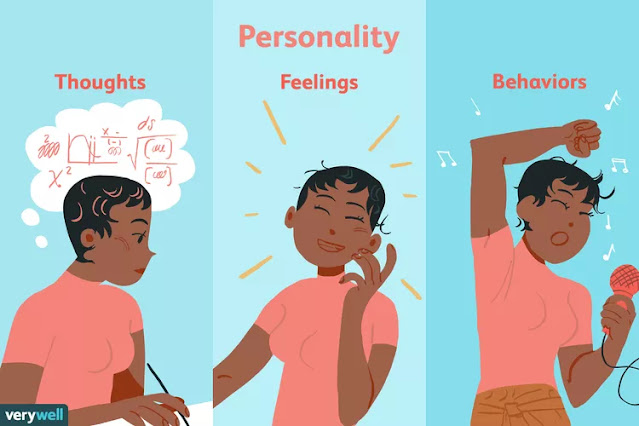Describes the unique patterns of thoughts, feelings, and behaviors that distinguish a person from others. A product of both biology and environment, it remains fairly consistent throughout life.
- According to the American Psychological Association, personality refers to the enduring behaviors, traits, emotional patterns, and abilities that make up a person's response to the events of their life.
Examples of personality can be found in how we describe other people's traits. For instance, "She is generous, caring, and a bit of a perfectionist," or "They are loyal and protective of their friends."
The word "personality" stems from the Latin word persona, which refers to a theatrical mask worn by performers to play roles or disguise their identities.
What exactly makes up a personality?
Traits and patterns of thought and emotion play important roles, and so do these fundamental characteristics of personality:
Personality Types
Type theories : suggest that there are a limited number of personality types that are related to biological influences.
One theory suggests there are four types of personality. They are:
- Type A: Perfectionist, impatient, competitive, work-obsessed, achievement-oriented, aggressive, stressed
- Type B: Low stress, even-tempered, flexible, creative, adaptable to change, patient, tendency to procrastinate
- Type C: Highly conscientious, perfectionist, struggles to reveal emotions (positive and negative)
- Type D: Worrying, sad, irritable, pessimistic, negative self-talk, avoidance of social situations, lack of self-confidence, fear of rejection, appears gloomy, hopeless
Personality Traits
Trait theories: tend to view personality as the result of internal characteristics that are genetically based and include:
- Agreeable: Cares about others, feels empathy, enjoys helping others
- Conscientiousness: High levels of thoughtfulness, good impulse control, goal-directed behaviors
- Eager-to-please: Accommodating, passive, and conforming
- Extraversion: Excitability, sociability, talkativeness, assertiveness, and high amounts of emotional expressiveness
- Introversion: Quiet, reserved
- Neuroticism: Experiences stress and dramatic shifts in mood, feels anxious, worries about different things, gets upset easily, struggles to bounce back after stressful events
- Openness: Very creative, open to trying new things, focuses on tackling new challenges
- Refers to the process of developing, enhancing, and changing one's personality over time.
- Such development occurs naturally over the course of life, but it can also be modified through intentional efforts.
- When we meet new people, it is often their personality that grabs our attention.
- Personality development refers to the process by which the organized thought and behavior patterns that make up a person's unique personality emerge over time.
- Many factors influence personality, including genetics and environment, how we were parented, and societal variables.
Personality Disorders :
While the symptoms of personality disorders vary based on the condition, some common signs include:
- Aggressive behavior
- Delusional thinking
- Distrust of others
- Flat emotions (no emotional range)
- Lack of interest in relationships
- Violating others' boundaries
Summary:
Understanding the psychology of personality is much more than simply an academic exercise. The findings from personality research can have important applications in the world of medicine, health, business, economics, technology, among others. By building a better understanding of how personality works, we can look for new ways to improve both personal and public health.


No comments:
Post a Comment